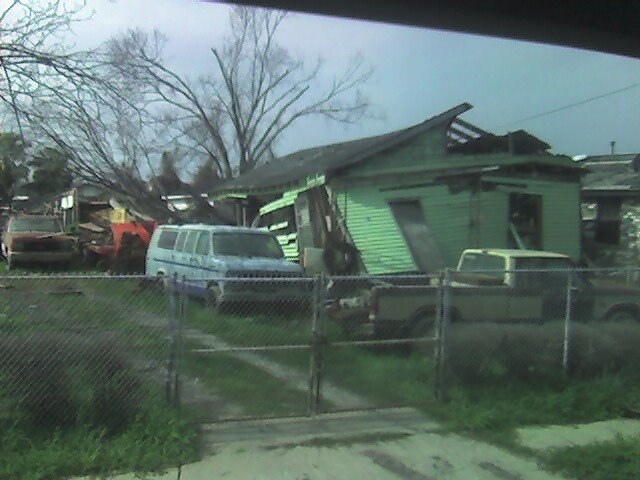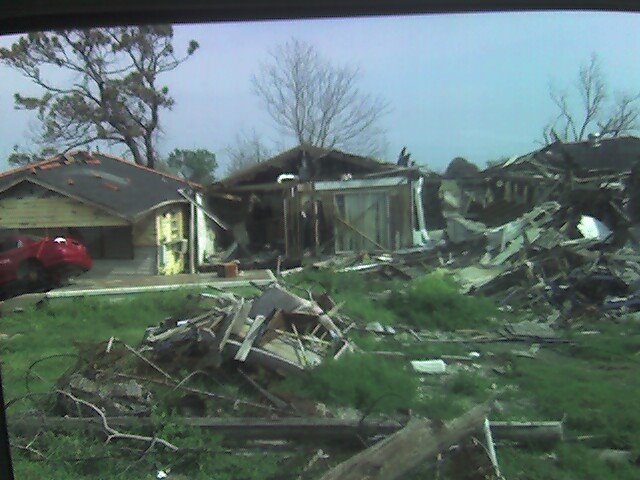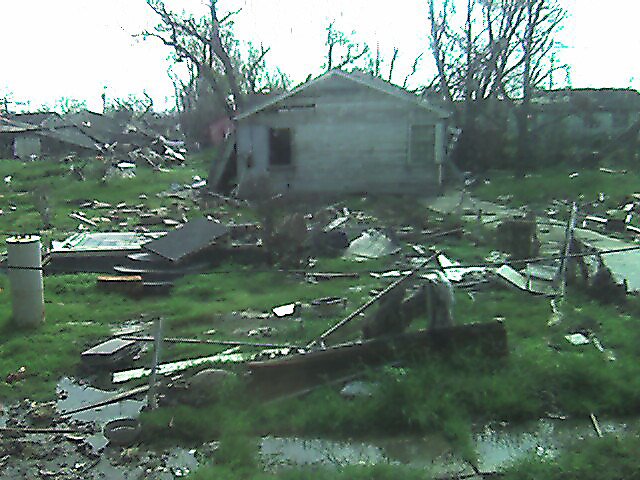New
Orleans Area Health Disparities Initiative
|
A coalition of New
Orleans area based and national racial and environmental justice, legal
and health research and advocacy organizations will convene an
invitational meeting on June 12, 2006, to address the post-Katrina
rebuilding process with the aim of creating safer and healthier
communities. The meeting venue is the Hilton New Orleans Riverside, 2
Poydras Streets, from 8:30am-5:00pm.
Background |
 |
The June 12, 2006 meeting is one
of a series of regional meetings organized by the Poverty and Race Research
Action Council (PRRAC) along with the Health Policy Institute of the Joint
Center for Political and Economic Studies and the Alliance for Healthy Homes.
The purpose is to highlight local responses to health disparities challenges in
communities of color. The meetings are intended to bring together public health
researchers, health care providers, community organizers, legal services and
civil rights lawyers, social scientists, urban and regional planners, policy
advocates, environmental justice advocates, advocates for healthy and affordable
housing, and local elected and appointed officials. Interdisciplinary
participants will share and learn about their common work and common ground in
order to better understand and redress health disparities.
Health is
holistically defined in this initiative to include all social, environmental and
health care systems (mental, physical and public) that disproportionately burden
low-income people of color. Examples of health in this context span such
environmental health hazards as those posed by multiple contaminant sources in
housing, schools, the workplaces of low-income communities of color and prisons
with disparate numbers of inmates of color. Health denotes public health;
mental health; health care infrastructure, access, and quality; and, most
notably, health care results for vulnerable populations such as children, women
of child-bearing years, people with disabilities, and the elderly.
Due to the scrutiny
of racial justice issues and health impacts in the aftermath of Hurricanes
Katrina and Rita, the New Orleans area is the first site in the series of
regional meetings about health disparities. We are also joined in this effort in
New Orleans by the Center for Social Inclusion, a New York based organization
that provides technical assistance on racial justice issues to local groups
around the country. The one-day meeting on June 12, 2006 and the planning
activities leading up to it will launch new collaborations and follow-up
initiatives, media coverage and public accountability focused on restoration and
a sustainable future for this unique region.
New Orleans Area Health
Disparities Initiative planners and partners include:
Michael Andry, EXCELth, Inc.;
Elodia Blanco, Concerned Citizens of Agricultural Street Landfill; Dr. Robert
Bullard, Environmental Justice Resource Center; Lura Cayton, Church World
Service Emergency Response Program; Johanna Congleton, Louisiana Physicians for
Social Responsibility; Veronica Eady, New York Lawyers for the Public Interest;
AlMarie Ford, LA Department of Health and Hospitals, Office of Mental Health;
Steve Fischback, Rhode Island Legal Services; Marcheta Gillam, Legal Aid
Society of Cincinnati; Shana Griffin, People’s Institute for Survival and
Beyond; Joanne Hale, Church World Service; Rebecca Harris-Smith, New Orleans
Black Nurses Association; Albert Huang, Natural Resources Defense Council; Dr.
Charlotte Hutton, LA Department of Health & Hospitals – New Orleans Adolescent
Hospital; Joy Lewis, Community Environmental Activist St. Bernard Parish; Judith
May, REACH 2010: At the Heart of New Orleans/Black Women’s Health Imperative;
Mary Lee Orr and David Brown, Louisiana Environmental Network; James Perry,
Greater New Orleans Fair Housing Action Center; Erol Quintol, New Orleans
Medical Assn; Rev. Cory Sparks, Carrollton United Methodist Church; Wilma Subra,
Chemist/Environmental Activist; Dr. Cheryl Taylor, REACH 2010: At the Heart of
New Orleans; Phil Tegeler, Poverty Race and Research Action Council; Ranie
Thompson, New Orleans Legal Aid Society; Dr. Sheila Webb, Center for Empowered
Decision Making; Lynne Wolfe, Center for Social Inclusion; Dr. Beverly Wright,
Deep South Center for Environmental Justice; Bob Zdenek and Ralph Scott,
Alliance for Healthy Homes.
The Sustainable Community
Development Group, Inc. is managing and coordinating the planning process, the
June conference, communications and logistics.
New Orleans Meeting June 12,
2006
The June 12th
meeting launches the New Orleans Area Health Disparities Initiative. The
focus of this meeting is health justice: fairness in targeting resources and
redressing structural racism and economic discrimination faced by communities of
color and low income communities in New Orleans. Rebuilding the New Orleans
area into safe and healthy communities for all inhabitants will require
re-evaluation and re-structuring to eliminate injustices and barriers to health
and quality of life.
Low-income
communities of color systematically subjected to different treatment with
respect to the condition of housing, schools, recreational space and economic
development are forced to shoulder discriminatory toxic insults, stress and
other disproportionate health burdens resulting in health disparities --–
increased illnesses, more neurologically-based learning differences and above
average premature deaths especially infants and young children. Health
disparities raise the alarm about how communities in the New Orleans area were
built and should be rebuilt.
Healthy people and
healthy communities exist where key factors intersect: access to quality and
affordable healthcare – good health insurance and good health care providers,
equal and quality treatment, environmental protection, decent housing, a living
wage, availability of nutritious food, and positive self-image. New Orleans now
has the opportunity to target resources, implement new social infrastructure and
sustainable development that promotes and ensures the civil right to health and
quality of life for everyone.
The June meeting will focus on
developing culturally sensitive, proactive strategies aimed at centering health
in the reconstruction debates on housing, economic development, employment,
education, environmental cleanup, restoration of natural resources,
transportation and mobility. The goal of the New Orleans Area Health
Disparities Initiative is to provide collaborative opportunities and a space for
local groups and organizations around the nation to identify and address
priority issues engage communities, policy makers, the public and private
sectors.
While participants
will determine future objectives of their collaborative work, the meeting will
consider the following objectives:
-
Establishing a new framework for understanding and talking
about health disparities grounded in the geographic specific history of race
and class in the New Orleans area;
-
Building new partnerships and greater alignment for
eliminating health disparities which cut across traditional boundaries of
health, science, the ambient and built environment, jobs, wages, fair
housing and legal services;
-
Implementing new community development and environmental
training programs for community leaders;
-
Securing health coverage for all residents of New Orleans;
-
Saving Charity Hospital and similarly challenged New Orleans
health care providers and institutions.
For more information, contact
Deeohn Ferris, Global Environmental Resources Inc., at
(202) 637-2467 or via email
address info@gerinc.com.
|
 |
 |
New Orleans photos courtesy; Vernice
Miller-Travis
|

NEW ORLEANS AREA HEALTH
DISPARITIES INITIATIVE
CONFERENCE AGENDA
June 12, 2006
8:00am – 5:30 pm
Hilton New Orleans Riverside
2 Poydras Streets
New Orleans, Louisiana
8:00am – 8:30am
Continental Breakfast
8:30am – 9:00am
Welcome and Purpose of
Meeting
Welcome and Introductions
Welcoming Remarks
-
Gail Christopher, DN, Joint Center for Political and Economic
Studies
-
Phil Tegeler, J.D., Poverty and Race Research Action Council
-
Robert Zdenek, DPA, Alliance for Healthy Homes
A Review of the Day’s Activities
9:00am – 10:00am
Panel: Promoting Health Justice: Opportunities in Healthy
Rebuilding of the New Orleans Area
Perspectives on the History and Culture of the New Orleans Area
·
Keith Weldon
Medley, Author, “We as Freemen: Plessy v Ferguson”
Deadly Waiting Game: Addressing Environmental Health Disparities
in Communities of Color
Investments in Human Capital and Healthy Rebuilding in the New
Orleans Area
10:00am – 10:45am
Health Disparities In Context:
What Are The Conditions That Led To The Creation Of Health Disparities In
Greater New Orleans And Opportunities For Change?
Plenary Discussion
Moderator: Deeohn Ferris, J.D.
10:45am – 11:00am
-- Break
11:00am – 11:30am
Presentations:
Action/Strategy Agenda for
Rebuilding Healthy Communities:
What Are The Immediate
Priorities That Need To Be Met And Opportunities To Ensure Healthy Rebuilding
For All New Orleans Communities?
Healthy Rebuilding: Strategies
To Meet Community Needs
Long Term Needs Identified
Through Community-Based Participatory Research – Rapid
Evaluation and Action for
Community Health in Louisiana: A Model for Assessing and Implementing Community
Priorities
11:30am – Noon
Table Discussion: What Strategies Do We Need to Achieve Our
Long-Term Goals? How to Reconcile Meeting Immediate Needs and Opportunities
With Long-Term Planning?
Noon – 12:30pm
Tables Report-Back/Plenary
Discussion
Moderator: Deeohn Ferris, J.D.
12:30pm – 1:30pm
Luncheon
Invocation
Luncheon Speaker – Gloria
WilderBraithwaite, M.D., MPH
1:40pm – 2:15pm
Panel: Analysis of a Post-Hurricane New Orleans Area Case
Study: Health Disparities, Health Care and Access – Planning, Challenges And
Opportunities In The Rebuilding Process
Panelists:
-
Michael Andry, EXCELth, Inc. -- Moderator
-
AlMarie Ford, LCSW, LA Department of Health and Hospitals,
Office of Mental Health
-
Charlotte Hutton, M.D., LA Department of Health and
Hospitals, New Orleans Adolescent Hospital
-
Monir Shalaby, M.D., Medical Director, EXCELth, Inc.
-
Ranie Thompson, J.D., New Orleans Legal Aid Society
-
Beverly Wright, PhD., Deep South Center for Environmental
Justice
2:15pm – 3:30pm
Small Groups -- Discussion of Case Study:
What Does The Case Study Suggest Are The Primary Issues For
Rebuilding A Healthy New Orleans For All Communities? What Strategic
Opportunities Exist That We Should Be Taking Advantage Of To Address These
Issues And Short- And Long-Term Goals?
1) identifying a few (small
number) priority issues to work on next;
2) some (also small number)
demands that go with these issues (or at least some principles to guide the
work); and
3) some sort of (very basic)
structure through which the work can be carried out collaboratively; and
4) identifying what external
and internal (to New Orleans) resources are available to support #3.
3:30pm – 3:45pm
-- Break
3:45pm – 5:30pm
Small Groups Report-Back/Plenary Discussion: Next Steps Moderator:
Deeohn Ferris, J.D.
·
What are the
commitments outside groups can make to this effort?
·
What kind of
structure can we create to continue this effort?
·
Are there any
issues we can identify as primary issues to work on?
·
How do we develop
a list of Demands around the primary issues identified
5:30pm — Adjourn
Additional Priority
Issues/Needs
-
Health and health care
delivery infrastructure
-
Communications, social
networks and institutions
-
Community organizing,
engagement
-
Mobility, transportation
-
Children’s health and
vulnerable populations (e.g., elderly, chronically ill, disabled)
-
Worker safety and health
-
Immigrant populations
-
Legal, advocacy
implications
-
Schools issues
-
Intersection of
Employment/Jobs, Education, Community Development
Small Group Facilitators
Joann Hale, Church World Service
Al Huang, J.D., Natural
Resources Defense Council
Judith May, Reach 2010: At the
Heart of New Orleans
Lynne Wolf, J.D., Center for
Social Inclusion
Bob Zdenek, DPA, Alliance for
Healthy Homes
Contact: Deeohn Ferris,
Global Environmental Resources Inc.
Phone: (202) 637-2467
Email: info@gerinc.com
Website: www.gerinc.com

| |
GERI is a woman-owned minority
business enterprise
"Making the Most of Our World"
|
|
|